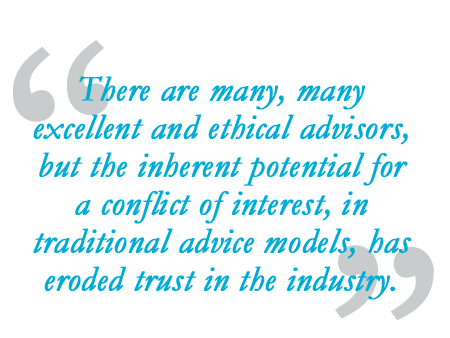By Karin Mizgala, Co-Founder and CEO, Money Coaches Canada

To say that many Canadians are cynical and wary of advice from the financial industry would not be overstating the situation. The idea of hidden fees and commissions buried in investment transactions was tough enough to swallow, but now bank employees are speaking out about sales quota pressures, that lead them to sell you products and services you may not even need.
Last summer the Canadian Securities Administrators (CSA) introduced Phase 2 of the Client Relationship Model, known as CRM2. As a result, if you have investments, you will be receiving two new reports this year: The Report on Charges and Other Compensation and the Report on Investment Performance. The report names speak to their content, but for a deeper understanding, you can read my article Are You Ready for the Truth About Your Investments.
The CSA wants to ensure that investors are provided with an itemized transparent account of what they are paying in fees, and what commission advisors are being paid and by whom. This information wasn’t completely unavailable before CRM2, but it was more difficult to obtain. The Investment Performance report endeavors to present a measure of how well your investments are doing, but unfortunately, without a comparative context, such as the performance of the underlying market, the numbers aren’t as meaningful as they should be.
The biggest eye opener, for many Canadians, will be the realization that the person making the most return on their investment may be their advisor. It isn’t that fees are inherently wrong, but it’s important to know whether or not you are receiving value for your money.
 So what can you do about high investment fees? First, you can make sure you are informed about the different available fee structures for financial advice, and second, you can decide if the advice you are currently receiving is meeting all your financial planning needs.
So what can you do about high investment fees? First, you can make sure you are informed about the different available fee structures for financial advice, and second, you can decide if the advice you are currently receiving is meeting all your financial planning needs.
Let’s look at how the industry ended up in these murky waters and what mindset shift by regulators and other financial professionals is leading financial advice in a new, fresh direction.
How did we get here?
The RRSP turns 60 this year. It was in 1957 that that federal government created this tax deferring savings vehicle for Canadians to have a more active role in planning for their retirement. Life expectancy in 1957 was 67 for men and 72 for women, and the idea of investing was quite new to the average Canadian. It stands to reason that the way to educate Canadians on the benefits of investing and to encourage them to sit down with an advisor, perhaps for the first time, was to offer advice for “free.”
The financial services we are most familiar with evolved from the idea of embedding financial advice within the sale of investments or other financial products. Today there are approximately 100,000 Canadian advisors offering and receiving payment for their services, through the commission-based advice model or the assets under management model.
Let’s take a look at each option.
Commission-based advice model
Quite simply, an advisor is paid a commission when an investor buys a product. The product is usually a mutual fund, but could be any investment product or even insurance. Many products also include a trailing commission for the advisor, to cover on-going advice they may (or may not) provide to the client. Until CRM2 required that these commissions be itemized and clearly presented they were often hidden inside the investment product cost.
Assets Under Management model
Under this method the advisor takes a percentage fee based on the amount of assets they are managing for the investor.
Over the years, as more and more Canadians came to the investing table, product sales became very lucrative to the financial industry. The financial advice on offer, still appeared to be free, but under the surface, conflicts of interest began making things cloudy.
 Advisors are human and have their own bills to pay and retirements to save for, so is it possible that from time to time they suggest an investment option when something else may be best suited to their client’s goals? For example, an advisor might recommend that a client with an inheritance invest, when paying down a mortgage would be the better use of the funds.
Advisors are human and have their own bills to pay and retirements to save for, so is it possible that from time to time they suggest an investment option when something else may be best suited to their client’s goals? For example, an advisor might recommend that a client with an inheritance invest, when paying down a mortgage would be the better use of the funds.
There are many, many excellent and ethical advisors, but the inherent potential for a conflict of interest, in both advice models, has eroded trust in the industry.
Beyond trust, the other downside to these two models is that they are heavily focused on investing. Many Canadians want and need much more comprehensive financial advice. They are looking for guidance in everything from day-to-day cash flow management, education savings, debt management, retirement planning, financial goal setting and estate planning.
It’s no longer 1957. Life expectancy is now 79 years old for men and 83 for women. Canadians are beginning to appreciate, that “free” advice often has a high price tag, and they are seeing that cost laid-bare under CRM2.
This higher expectation has led to a paradigm shift for many people within the financial industry and for a growing number of Canadians who now require more of themselves and their advisors.
The result is the growing interest in a new compensation model. And a focus on reducing high investment fees.
Fee-for-service financial advisors
The fee-for-service model, which is the model we use at Money Coaches Canada, creates an alliance between client and advisor. There are approximately 200 advisors in Canada  working within this new standard. The advisor is paid up-front by the client, so the client’s best interest and the advisor’s best interest are no longer in potential conflict. Advice is tied to a comprehensive understanding of the client’s needs and goals.
working within this new standard. The advisor is paid up-front by the client, so the client’s best interest and the advisor’s best interest are no longer in potential conflict. Advice is tied to a comprehensive understanding of the client’s needs and goals.
A fee-for-service advisor understands that most people’s financial aspirations include more than just planning for retirement. They want to live well now, manage debt, ensure the education of their children, leave a legacy, perhaps even start a business or help aging parents. Every Canadian dream is different, and fee-for-service advisors are paid to help make those dreams reality. Knowing that their advisor is paid to be an ally allows trust to flourish.
Not only do clients find this complete transparency refreshing, many advisors who have been in the industry for years are moving to this model because they get a deep satisfaction from being more aligned with their clients best interest.
Where to Go from Here?
If you have decided that your current advisor is not the best fit for your needs, you owe it to yourself to find someone new. One of the best ways is through referrals from family or friends, but MoneySense online also offers a directory of MoneySense Approved advisors. Their screening process evaluates transparency, customer service, pricing, knowledge and experience. You can read more about it, or conduct a search on their website. You can also do an internet search on your own, or visit our coaches page.
Once you selected a prospective new advisor contact them and have a conversation. Important things to ask are:
- What are your professional designations and what is your experience?
- How, and how much, do you charge for your services?
- Do you sell products, and if so, do you receive commissions or referral fees?
- How many clients do you work with at one time?
- How comprehensive are your services?
- In which areas are you able, or not able, to give advice?
- Are you able to help with my financial concerns beyond investing?
Money Coach Noel D’Souza wrote an extensive post on questions to ask your financial advisor. To read his full article, please go here.
Your Money Should Serve You, Not Your Advisor
Financial advisors in Canada are held to a standard, but for many advisors, that standard only requires that they provide suitable advice. A suitable option is not always the best option. Money Coaches Canada has built our business around the belief—that Canadians deserve the best advice, always.
We hope this article has been helpful and provided some practical advice on how you can improve your financial well-being. If you need additional support, please contact one of our Money Coaches today.


